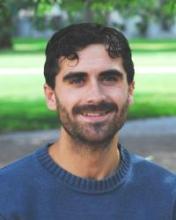SOCIOLOGISTS MAKING A DIFFERENCE
Brandon Morande’s research examines the intersections between punishment, poverty, and neighborhood change. He aims to identify when and why authorities respond to inequality with punitive interventions, such as arrest or banishment. He additionally seeks to understand how these tactics impact people’s connections to place and community.
At UW, Brandon has mainly studied these topics in relation to homelessness in Seattle. He currently collaborates with Dr. Zack Almquist and Dr. Amy Hagopian to investigate people’s housing outcomes and relocation patterns following encampment sweeps. Although literature provides evidence of the harmful health and material effects of clearances, the consequences for exiting homelessness remain less clear. Using client data from local service provider ETS REACH, they find that the likelihood of entering shelter or housing appears relatively low. Instead, individuals seem most likely to lose contact with REACH, while those who stay unsheltered do not travel far. Sweeps also substantially reduce the size of camp communities, suggesting that they might primarily serve to manage the visibility of concentrated homelessness. The team is excited to present these initial findings at the 2025 Western Society of Criminology conference.
Brandon’s MA thesis similarly focuses on the connections between neighborhood change and policing homelessness. His study specifically interrogates how shifts in property value relate to encampment sweeps and vehicle impoundments. As a research assistant, he also works with Dr. Kyle Crowder and Dr. Charles Lanfear on a project assessing social disorder on public transportation. The group aims to collect data that will allow Sound Transit to identify common problems and improve ridership, while minimizing harms for vulnerable populations (e.g., unhoused passengers). The study furthermore involves mapping neighborhood characteristics that might contribute to perceived disorder, ideally allowing Sound Transit to work with other public agencies to develop more equitable and impactful interventions.
This quarter, students in Dr. Anne Tseng’s SOC 403 course will pilot data collection with Brandon’s support. Alongside these efforts, Dr. Nathalie Williams and Dr. Tyler McCormick will conduct a survey of the general Seattle population to better understand perceptions and reactions to transit issues.
Brandon additionally participates in the Sound Data project led by Dr. Williams and Dr. Jerald Herting, which will pioneer a longitudinal survey of the unhoused population in the Puget Sound. This initiative seeks to provide representative data for public officials and legislators to better address homelessness. Alongside other students, he has helped facilitate focus groups with unsheltered participants, and the team soon plans to provide a report to the city based on results from a pilot survey. Alum Dr. Lindsey Beach, graduate student Adam Visokay, and Brandon also recently helped the Washington State Center for Court Research complete a report evaluating
trends in legal financial obligations. The paper explores patterns in imposition and outstanding debt, broken down by court level, location, offense type, and defendant demographics. The findings should aid in recommending reforms to alleviate the impacts of monetary sanctions, especially on youth and from unpaid obligations.
Personal experiences of housing insecurity and homelessness have long motivated Brandon to pursue a career addressing these issues. As an undergraduate at Bowdoin College, he previously researched how public institutions in Argentina medicalize homelessness as a symptom curable through rehabilitation. Drawing on interviews and observation, he demonstrated how civil society networks and peer groups reimagine care as a collective right and means to contest such practices. Inspired by these findings, Brandon thereafter completed a Thomas J. Watson Fellowship. Traveling to the United Kingdom, Denmark, New Zealand, and Chile, he explored how peer-based initiatives empower people confronting homelessness to share experiences, develop solidarity, and survive the streets. His project also examined how these communities occupy often inaccessible spaces (e.g., art, journalism, and sports) to alter public perceptions of homelessness.
After returning from abroad, he worked with a street outreach program in North Carolina, helping people sleeping unsheltered to access permanent housing and avoid criminal legal involvement. During this period, he also served on a local Housing Advisory Board, reviewing and voting on development proposals. Through this role, he sought to expand affordable options for people with limited incomes, criminal histories, and other barriers.
With his future research, Brandon hopes to continue supporting such efforts to decriminalize homelessness, prevent displacement, build community, and end housing insecurity.
